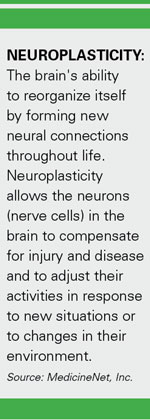
Technological advances in neuroscience can help you recover—and perhaps even exceed—your previous level of performance.
Imagine you are about to make an important presentation in front of a large group or boardroom, or even a small meeting with your boss, coworkers, prospective client or potential investor. You are well prepared. Your materials are all set to go. You’ve rehearsed your script. But you do not feel in control of your emotions… You begin to panic. Your mind begins to wander and your thoughts become foggy. Your heart is beating fast. Your breathing is shallow, and your palms are becoming clammy. No matter how you try to collect yourself, it’s now showtime!
The Well-Functioning Brain
Beyond your baseline intelligence and technical knowledge, the most important tool you have to ensure your success is a well-functioning brain. The brain is an amazing organ: its three pounds of soft, gray and white matter control every aspect of your emotional, physical, cognitive and behavioral responses. This delicate instrument is affected by everything you experience in your life. It can become dysregulated by many things, including genetic predispositions, birth stress or trauma, inadequate early attachment, repeated high fever and illness, head injury, surgical exposure to anesthesia, psycho-social distress, chronic medication and/or substance use, emotional trauma and aging.
There are many things you can do to help maintain healthy brain functioning and improve its neuroplasticity. This includes:
- Getting seven to eight hours of good, quality sleep each night;
- Exercising 20 to 40 minutes a day;
- Eating a diet of protein and healthy complex carbohydrates, with little to no sugar or simple carbs;
- Limiting screen time to two hours a day beyond what is necessary for work or school;
- Taking food supplements such as omega-3s to decrease oxidative stress to the brain; and
- Limiting the consumption of alcohol, drugs and even certain medications.
But what if—despite all your efforts to stay healthy—you’ve begun to feel your days of optimal performance are slipping away? Is all lost? Is a steady decline and retirement all you have to look forward to?
Strategies for Brain Training
Today’s technological advances in neuroscience, brain training and strategies for optimal performance can help you recover—and perhaps even exceed—your previous level of performance. How is this possible? At the Neurotherapy Institute of Central Illinois, we employ three powerful strategies.
 The first involves coaching on how to improve your neuroplasticity, so your brain can function more efficiently by enriching existing neurons, promoting the generation of new neurons and forming healthier neuronal networks across the brain. The second is to provide biofeedback training that develops stronger physiological self-regulation from the “bottom up,” or from the body to the brain. This involves the use of peripheral skin temperature and heart rate variability training to calm the body and optimize brain functioning.
The first involves coaching on how to improve your neuroplasticity, so your brain can function more efficiently by enriching existing neurons, promoting the generation of new neurons and forming healthier neuronal networks across the brain. The second is to provide biofeedback training that develops stronger physiological self-regulation from the “bottom up,” or from the body to the brain. This involves the use of peripheral skin temperature and heart rate variability training to calm the body and optimize brain functioning.
The third is to directly train the brain from the “top down,” or from the brain to the body, with neurofeedback to improve the brain’s neurological self-regulation by decreasing any high brain activity related to anxiety, hyperactivity or insomnia; increasing any low brain activity related to depression, lack of motivation, inattention or cognitive inefficiency; and enhancing your brain’s neuronal network communication so its complex functioning works more smoothly and efficiently toward superior outcomes.
Meaningful Benefits
The results of brain training for optimal performance are many. They may include reduced anxiety, depression or chronic pain; increased endurance and enhanced performance; better memory retrieval and improved working memory; sustained attention and situational awareness; goal-directed behavior; and emotional regulation.
While those with existing, more serious problems can expect to see significant improvement, even those without significant problems can improve their overall optimal functioning. Research has found meaningful benefits for business people who improved their sustained concentration by nearly 100 percent; employees who had 65-percent less tension, 40-percent less sleepiness and 43-percent greater sense of well-being; surgeons whose surgery time was reduced by 26 percent, with a four- to seven-percent improvement in technique; college students who found a 16- to 17-percent increase in concentration and information processing, with an eight- to nine-percent increase in overall cognitive ability; musicians who saw a 17-percent increase in ratings of their musical performance; and athletes who have won the World Cup, Olympic gold medals and NBA, MLB, NHL, PGA and NFL championships. Even the U.S. military has used these techniques to improve soldiers’ marksmanship, pilots’ performance and Special Forces’ effectiveness.
If your performance has been slipping and you’ve done all you can do to “right the ship” without much meaningful progress, you owe it to yourself to learn more about brain training for optimal human performance. With the investment you’ve made in your education and career achievement, attending to your brain’s optimal health can make the critical difference between continued success… or gradual decline. iBi
Ted Chapin, PhD is a Licensed Clinical Psychologist at Neurotherapy Institute of Central Illinois, a division of Chapin & Russell Associates.

